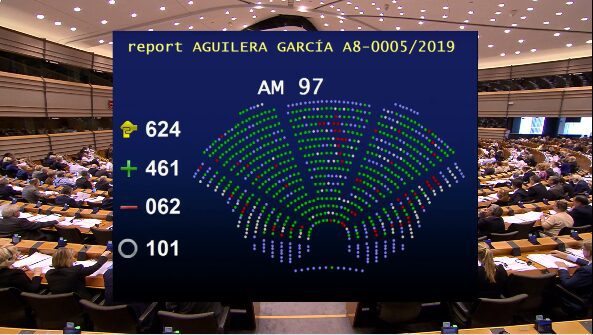EU Mediterranean plan to allow trawling in fish nurseries
Unambitious political deal on EU’s first multiannual fisheries plan contradicts the objective of Common Fisheries Policy
Press Release Date: April 4, 2019
Location:
Contact:
Marta Madina | email: mmadina@oceana.org | tel.: Marta Madina

The European Parliament approved today in a plenary vote the first multiannual plan for demersal stocks (fish that live and feed near the sea bottom) for the Western Mediterranean Sea. With 461 votes in favor and 62 against, the legal obligation of reaching sustainable fishing by 2020 at the latest, as agreed under the Common Fisheries Policy, has been postponed to 2025. Oceana is disappointed with the political hesitation to effectively restore the world’s most overfished sea, rebuild depleted stocks and to restrict destructive bottom trawling practices.
“The wild west situation prevailing in Mediterranean fisheries is driving the region to the edge of an environmental crisis. Decision makers know the path to sustainability as they already followed it to rebuild the Atlantic fisheries. Half-hearted measures adopted today in Parliament suffice as a needed stepping stone, but we need more to save Mediterranean fisheries,” said María José Cornax, Policy and Advocacy director for Oceana in Europe.
Oceana considers the plan to be a small step in the right direction as it will avoid, for the first time, double standards when it comes to fisheries management among Spain, France and Italy. However, the Mediterranean is still far from ending overfishing, with more than 80% of stocks still being overfished.
“The coming months will be key to ensure that the plan is implemented effectively by Member States that must adopt the right measures to reduce fishing impacts on ecosystems and reject broad derogations. Otherwise, emergency measures by the EU will be inevitable — including closing fisheries that are at risk of collapsing,” said Nicolas Fournier, policy advisor at Oceana.
Weakening bottom trawling restrictions in coastal waters is one of the key derogations introduced by the EU co-legislators under the new plan. The flexibility offered to the trawling fleet largely outweighs its potential benefits for the environment. Oceana calculates that, due to an increase by up to 50% of fishing hours authorised per day and despite a potential reduction in fishing effort, bottom trawling activities could increase in Spain by up to 35% in the first year.
The first EU multi-annual fisheries plan in the western Mediterranean Sea will enter into force as of January 1, 2020. It will then be the responsibility of the governments of Spain, Italy and France to raise their ambitions and implement effective measures to restrict destructive bottom trawling, protect juveniles and spawners, and ensure sensitive habitats protection.
Learn more: Western Mediterranean. Act now, or lose it forever
#WestMedMAP #WMedMAP #CFPreality

